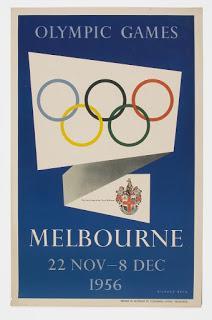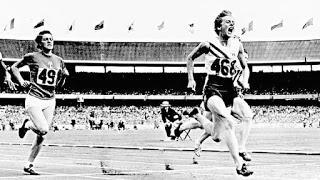
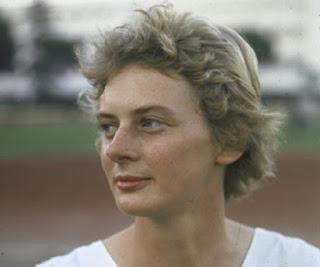
The Australian fans had had high expectations for the women's track events, but they did not really have the "Golden Girl" from Sydney on their minds. Shirley de la Hunty was expected to be the star of the Games. She indeed defended her title in the 80 meters hurdles, but before that, she had bowed out in the heats of the 100 meters dash. It was a shocking moment for hometown fans, all the more as Cuthbert was considered to be a 200 meters specialist. In this event, she had set a new world record at 23.2 seconds two months before the Games.
But with Strickland sidelined, Cuthbert rose to the occasion, holding off East Germany's Christa Stubnick and teammate Marlene Matthews to capture the gold. Three days later in the 200, the outcome was the same. When Cuthbert anchored her team's relay team to the gold, her status as a natonal heroine was secured. All of her running with that typically wide opened mouth, about which Cuthbert used to say: "Everything I did that required effort, I opened my mouth. Even to catch a ball, I opened my mouth."
The hype that followed was a little to much for a shy and slightly build 18 year old. Cuthbert indeed had no easy time in the years to follow. Hampered by a hamstring injury, she was eliminated in the heas at the 1960 Rome Olympics and retired. Two years later, Cuthbert had a terific comeback, winning the Commonwealth title in the 400 meters. At the same distance, she crowned her career with a fourth Olympic gold in 1964 at the Tokyo Games (picture: ABC).
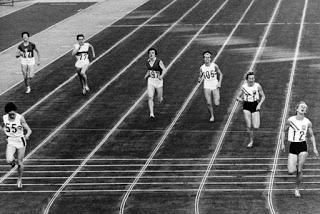
A fighter that she had been on the track, Cuthbert also was in her later life. In 1974, she was diagnosed with multiple sclerosis that forced her into a wheelchair. But that did not prevent her from carrying the Olympic torch into Stadium Australia at the opening ceremony of the 2000 Sydney Games, showing off her trademark optimism and perseverance. It was one of many memorable moments of the Millennium Olympics (picture: The Australian).
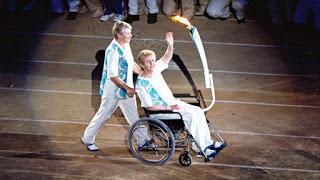
News of the day: Bob Richards (USA) defends his pole vault title, Tom Courteney (USA) gets the 800 meters gold. +++ Norway's Eigil Daniels wins the javelin throw with a new world record of 85.71 meters. +++ The USA and the USSR continue there weightlifting domination: Tommy Kono (USA/Light heavyweight), Arkadi Vorobiov (USSR/Middle heavyweight), and the "Tennessee Titan" Paul Anderson (USA/Heavyweight) win the last three golds. +++ Fencer Christian d'Oriola of France repeats his win in the individual foil competition.
